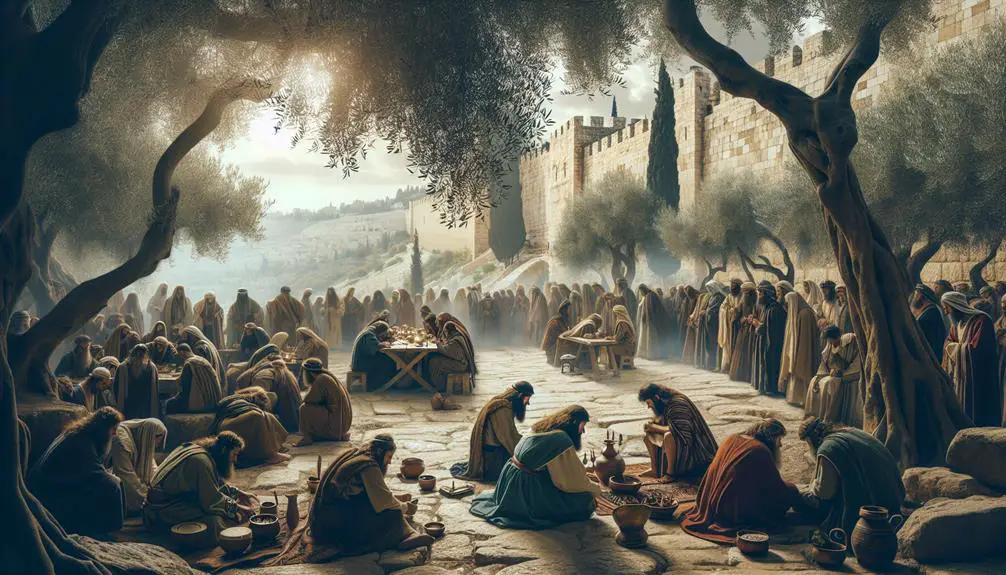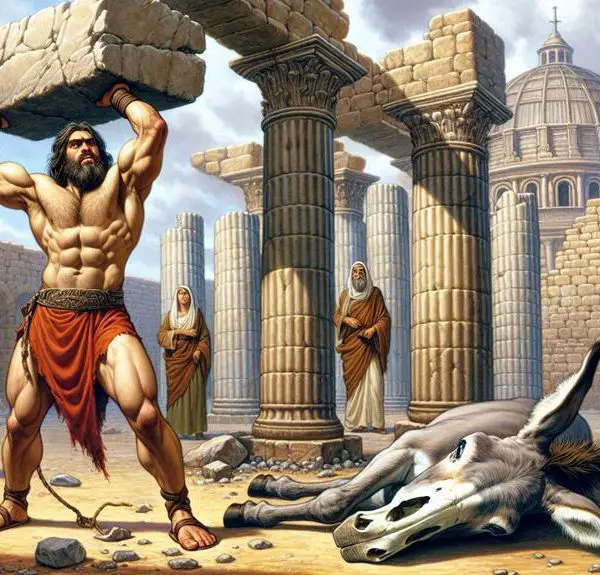Discover how Ezra's act of fasting before a perilous journey reveals the transformative power of faith and community in ancient texts.

Ezra Fasting in the Bible
Just as a single thread can start to unravel a whole tapestry, Ezra's decision to fast before embarking on his perilous journey from Babylon to Jerusalem symbolizes the power of faith to weave through adversity.
You might wonder how this act of fasting, seemingly simple and personal, could rally a community and strengthen their collective faith. It's a testament to the profound impact of spiritual practices on communal resilience and individual fortitude.
As we explore this ancient narrative, consider how the principles of Ezra's fast could illuminate contemporary discussions about the role of fasting and faith in today's world.
Key Takeaways
- Ezra's fast symbolizes spiritual cleansing and preparation for divine communion amidst the challenges of restoring Israelite identity post-exile.
- Fasting serves as a method for the community to achieve spiritual purity, humility, and discipline under Ezra's leadership.
- The practice highlights the importance of self-denial and prayer in seeking divine guidance for personal and communal resilience.
- Ezra's journey and the outcomes of the fast reinforce the significance of religious and social order based on Torah laws.
The Context of Ezra's Fast

In examining the context of Ezra's fast, it's essential to recognize its placement within a pivotal moment of spiritual and communal restoration for the Israelites. You're delving into a period where the Israelites were returning from Babylonian exile, grappling with the reconstruction of their identity and religious practices. Understanding Ezra's background provides critical insight into this transformative era. As a scribe and priest, his profound commitment to the Torah and his leadership role significantly influenced the community's direction towards religious renewal.
The political climate of the time further compounds the significance of Ezra's actions. The Persian Empire, under which the Israelites lived, allowed a degree of religious autonomy but maintained strict control over the political and social structures. This delicate balance required careful navigation to foster a sense of community and religious identity without inciting the ire of Persian authorities. Ezra's fast, therefore, wasn't merely a personal act of piety; it was a strategic move within a highly charged political environment. It aimed at rallying the community around a shared spiritual purpose, emphasizing the need for purity and dedication to the laws of Moses, and subtly reinforcing the Israelites' distinct identity amidst external pressures.
Significance of Fasting in Judaism

You'll find that fasting in Judaism isn't merely an act of abstaining from food; it's deeply intertwined with atonement and spiritual cleansing. This practice reflects a profound belief in the power of fasting to purify the soul and reconcile with God.
Examining Ezra's fast, you see a vivid illustration of how these elements of atonement and purification are central to the Jewish faith.
Fasting as Atonement
Fasting's role in Judaism serves as a profound act of atonement, reflecting a deep-seated tradition of seeking forgiveness and spiritual purification. This practice intertwines with dietary restrictions, underscoring its significance beyond mere abstention from food. The health implications of fasting are twofold, offering both a physical cleanse and a metaphorical preparation for spiritual renewal.
Consider these aspects of fasting as atonement:
- Self-discipline: It demands a rigorous exercise of willpower, aligning physical hunger with spiritual hunger for atonement.
- Community solidarity: Fasting collectively embodies a communal quest for forgiveness, reinforcing social bonds.
- Reflection and introspection: It provides a time-out from daily routines, facilitating deeper self-examination and repentance.
In essence, fasting as atonement in Judaism encapsulates a holistic approach to spiritual well-being, harmonizing body and soul in the quest for divine forgiveness.
Spiritual Cleansing Through Fasting
Engaging in fasting, Judaism offers a path to spiritual cleansing that transcends mere physical abstention, inviting adherents to explore a deeper connection with the divine. This practice, deeply rooted in tradition, aligns with dietary restrictions not only as a form of penance but as a vehicle for attaining purity and enlightenment.
Analyzing the health benefits, it becomes evident that fasting isn't merely about denying oneself food; it's a holistic approach that encompasses physical well-being to enhance spiritual receptivity. By adhering to these dietary restrictions, you're not just cleansing your body but also preparing your mind and spirit for a closer communion with the divine.
This dual benefit underscores fasting's significance in Judaism, bridging the physical and spiritual realms in a quest for holiness and self-discipline.
Ezra's Journey From Babylon

Ezra's journey from Babylon, often overlooked, marks a pivotal moment in Jewish history, as he led a group of exiles back to Jerusalem to restore their religious practices and laws. This return from the Babylonian exile under Ezra's leadership not only symbolized a physical return to their homeland but also represented a spiritual reawakening for the Jewish people.
Ezra's leadership during this critical period was instrumental. He wasn't just a leader; he was a spiritual guide, tasked with re-establishing the Torah's laws among a people who'd lived under foreign rule for decades. The significance of this journey can be highlighted by three key aspects:
- The restoration of religious and social order based on the Torah.
- The reconstitution of the Jewish community in their ancestral homeland.
- The reinforcement of Jewish identity amidst a multicultural empire.
Analyzing Ezra's return, it becomes evident that this was more than a mere migration. It was a mission charged with spiritual and national revival. Ezra's adept leadership ensured not just the physical relocation of the Jewish people but also the preservation and reinforcement of their religious traditions and laws, setting a foundation for future generations.
Preparing for the Fast

Having established the foundation for Jewish religious and social order, attention now turns to the specific spiritual discipline of fasting that Ezra prepared for, highlighting its significance in the broader context of communal renewal. You'll find that Ezra's approach to fasting wasn't impulsive; rather, it was marked by meticulous dietary preparation and mental readiness.
Dietary preparation, in this instance, wasn't merely about abstaining from food and drink. It was a deliberate reduction in intake and a gradual shift towards simpler, less indulgent foods. This process wasn't just physical; it also served as a tangible act of humility and penance, aligning the body's desires with the spirit's intentions.
Mental readiness, on the other hand, involved cultivating a mindset that was receptive to the lessons and revelations fasting was meant to impart. You'd see Ezra and his followers engaging in introspection, prayer, and study, further solidifying their commitment to this discipline. This wasn't just about physical endurance but about preparing the heart and mind for a transformative experience.
In essence, the preparation for the fast underscored the holistic approach to spirituality that Ezra championed, integrating physical discipline with mental and spiritual fortitude.
The Collective Fast

The collective fast, as orchestrated by Ezra, represented a communal act of spiritual renewal and collective repentance, embodying the community's unified pursuit of divine favor. This act wasn't merely a personal endeavor but a collective effort that underlined the importance of community solidarity in the face of adversity. Through this shared experience, the community not only sought forgiveness and guidance but also experienced the health benefits associated with fasting, which inadvertently bolstered their collective resilience.
In analyzing the collective fast, it's crucial to highlight:
- The importance of community solidarity as a foundation for collective spiritual endeavors.
- The role of collective fasting in enhancing the physical and spiritual well-being of the community.
- The significance of shared experiences in fostering a deeper sense of unity and purpose among community members.
This emphasis on community solidarity underscored the belief that spiritual purification and renewal were achievable through collective action. Moreover, the health benefits associated with fasting further contributed to the community's overall well-being, making the collective fast a multifaceted practice with both spiritual and physical dimensions.
Outcomes of the Fast

Following the collective fast, outcomes manifested in both spiritual renewal and tangible changes within the community, illustrating the profound impact of unified spiritual practices. You'll see that the act of fasting wasn't merely a ritualistic endeavor but served as a catalyst for significant transformations. The health benefits, though not the primary focus of the fast, became an inadvertent outcome. Improved physical well-being among participants was noted, which in turn, contributed to a more robust and resilient community.
Moreover, the political implications of this collective act of faith were profound. The unity and spiritual dedication displayed through the fast sent a powerful message to surrounding nations and political entities. It demonstrated a collective strength and resolve that transcended the mere physical act of abstaining from food. This unity and newfound strength led to shifts in political relationships and dynamics, fostering a period of peace and stability that allowed the community to flourish.
In essence, the outcomes of the fast extended far beyond the spiritual realm, affecting both the health of the individuals involved and the political landscape of the time. This multifaceted impact underscores the complex interplay between faith, community, and the broader sociopolitical environment.
Lessons From Ezra's Fast

As you reflect on Ezra's fast, you'll uncover how it serves not merely as an act of piety but as a profound lesson in spiritual discipline.
The purpose of his fast, beyond the immediate context, reveals a universal principle of seeking divine guidance through self-denial.
Moreover, Ezra's prayerful dependence during this period exemplifies a model of spiritual growth that's deeply rooted in humility and trust in God's providence.
Purpose of Ezra's Fast
In exploring the purpose of Ezra's fast, it's crucial to understand how this act served as a profound demonstration of humility and dependence on God for protection and guidance during a perilous journey. This spiritual exercise wasn't merely about abstaining from food; it was a deliberate, communal plea for divine intervention.
Through fasting, Ezra and the people sought to:
- Purify themselves spiritually and physically.
- Showcase their total reliance on God's providence.
- Prepare mentally and spiritually for the challenges ahead.
Analyzing this event reveals that dietary restrictions and the health benefits of fasting, while significant, were subordinate to the overarching goal of seeking God's favor and guidance. This distinction underscores the multifaceted nature of fasting, encompassing physical, spiritual, and communal dimensions.
Spiritual Growth Through Fasting
Exploring Ezra's fast reveals that, beyond physical abstention, this practice significantly fostered spiritual growth and heightened collective faith among the participants. Fasting, as Ezra demonstrates, isn't merely about the health benefits or adhering to dietary restrictions. It's a profound exercise in humility and reliance on divine guidance.
By voluntarily imposing dietary restrictions, individuals engage in a deliberate act of self-denial, redirecting their focus from physical sustenance to spiritual nourishment. This shift not only cultivates personal discipline but also strengthens communal bonds, as participants share in this act of faith.
Thus, Ezra's fast underscores the transformative power of fasting in deepening one's spiritual connection and fostering a collective spiritual awakening, beyond the tangible health benefits it may also offer.
Ezra's Prayerful Dependence
Delving into Ezra's fast, we observe that his prayerful dependence wasn't merely a ritual act but a profound demonstration of faith and trust in divine providence. Under Ezra's leadership, the community sought guidance and protection through deliberate prayer tactics. This approach underscores several key lessons:
- Ezra's humility in recognizing the limits of human power
- The collective seeking of divine favor, highlighting unity
- Strategic use of fasting as a means to enhance spiritual clarity and focus
Ezra's method reveals a deep reliance on spiritual resources over physical might. His leadership, infused with prayer tactics, offers a timeless model for navigating challenges. Through this lens, Ezra's fast becomes a masterclass in fostering a community's spiritual resilience and dependence on a higher power.
Fasting and Faith Today

Fasting, as a manifestation of faith, continues to play a crucial role in modern spiritual practices, shaping believers' lives and perspectives. In today's context, you'll find that intermittent fasting not only forms a part of health and wellness regimes but also integrates into religious observances, reflecting modern adaptations of ancient traditions. This blend of the physical and spiritual underscores a holistic approach to faith, where the discipline of the body aids in the purification of the soul, mirroring the intentions behind Ezra's fasts in the scriptures.
As you delve deeper into current practices, it becomes evident that fasting serves as a bridge connecting individuals to a profound sense of spirituality, often leading to personal revelations and a strengthened relationship with the divine. It's in this deliberate abstinence that you're invited to reflect, pray, and seek closer communion with God, just as Ezra did. The act, therefore, transcends mere ritual to become a transformative experience, reshaping not only one's spiritual journey but also influencing communal faith expressions. Through these modern adaptations of fasting, the enduring relevance of such practices in nurturing faith and fostering a deeper connection with the divine is unmistakably affirmed.
Frequently Asked Questions
How Did Ezra's Personal Life and Background Influence His Decision to Proclaim a Fast?
You're exploring how personal experiences shape decisions, focusing on an individual's education and the surrounding political climate.
Ezra's education, deeply rooted in religious studies, and the tense political climate of his time significantly influenced his actions.
This background not only equipped him with the knowledge but also the conviction to lead through faith, culminating in his decision to proclaim a fast as a means of seeking divine guidance and protection.
Are There Any Specific Dietary or Physical Preparations Individuals Made to Participate in Ezra's Fast, Beyond the Spiritual Preparation Mentioned?
In a world where fasting often goes to the extreme, you'd be fascinated to know that before jumping into their fast, individuals took meticulous steps, like adopting specific hydration methods and calculating the fasting duration to a T.
They weren't just winging it; there was a science to their spiritual preparation. This analytical approach ensured their physical readiness matched their spiritual fervor, blending ancient wisdom with practical, health-conscious strategies.
How Did the Fasting Practices in Ezra's Time Compare With Other Contemporary Cultures or Religions Outside of Judaism?
You're diving into how fasting practices during Ezra's era stack up against those in contemporary cultures, notably Roman rituals and Zoroastrian observances.
While Romans might've incorporated fasting into their rituals sparingly, focusing more on feasts and sacrifices, Zoroastrians likely observed fasting as a spiritual purification method, akin to Jewish practices.
Analyzing these differences sheds light on the unique spiritual and cultural landscapes of the time, highlighting the diverse approaches to fasting.
What Were the Immediate Reactions of the People Around Ezra When He First Proposed the Fast?
When you first proposed the fast, you were met with public skepticism. People around you doubted the impact and questioned your leadership qualities. Despite these doubts, your resolve didn't waver.
You understood the skepticism as a natural response to a new idea, especially one demanding such personal sacrifice. Analyzing this reaction, it's clear that your leadership was pivotal in eventually swaying public opinion, demonstrating the importance of steadfastness in the face of doubt.
How Has the Story of Ezra's Fast Been Interpreted or Utilized in Modern Religious Teachings or Practices Outside of Traditional Judaism?
In today's spiritual landscape, over 80% of religious educators reference historical fasting practices to enrich faith. Ezra's influence extends beyond traditional Judaism, as his fasting story is a cornerstone in modern adaptations across various faiths.
These teachings emphasize communal repentance and spiritual cleansing, mirroring Ezra's original intentions. This analytical approach highlights how Ezra's fast, though ancient, remains a vital tool in contemporary religious discourse, offering a bridge between past traditions and current spiritual practices.
Conclusion
In dissecting Ezra's fast, we've journeyed through a spiritual odyssey that's as monumental as parting the Red Sea.
You've seen how fasting, more than a mere abstention, served as a collective cry for divine guidance and protection.
This ancient practice, deeply embedded in Judaism, not only fortified their faith but also prepared them for the arduous journey ahead.
Today, embracing fasting can similarly transform our spiritual landscape, offering profound lessons in faith, resilience, and communal solidarity.



Sign up